Climate Change and Disaster Management Program
 DUS is geographically located at very exposed disaster risk area of Coastal Bangladesh, most of its beneficiaries as well as core staffs of the organization and volunteers including general members are experienced by the influence of topography & living experience with the community, to cope with and face any natural disaster. Further during its lifetime DUS was active in major emergency in relief and rehabilitation programs following Nov. 1970 cyclone relief, 1988/ 1991-cyclone recovery, 1998 flood response, SIDR 2007 etc. DUS is now moving beyond relief and rehabilitation into institutionalized preparedness, risk reduction and management interventions as well as long term adaptation strategies as consequence of lessons learnt while helping communities cope with the devastating effects of Cyclone SIDR, which struck in November 2007.
DUS is geographically located at very exposed disaster risk area of Coastal Bangladesh, most of its beneficiaries as well as core staffs of the organization and volunteers including general members are experienced by the influence of topography & living experience with the community, to cope with and face any natural disaster. Further during its lifetime DUS was active in major emergency in relief and rehabilitation programs following Nov. 1970 cyclone relief, 1988/ 1991-cyclone recovery, 1998 flood response, SIDR 2007 etc. DUS is now moving beyond relief and rehabilitation into institutionalized preparedness, risk reduction and management interventions as well as long term adaptation strategies as consequence of lessons learnt while helping communities cope with the devastating effects of Cyclone SIDR, which struck in November 2007.
DUS is now implementing its Climate Change and Disaster Management Program for four thousand six hundred and five (4,605) nos. households in two char area of Hatiya Upazilla in collaboration with GoB with financial support of the Netherland Govt. The main component of the program is to focus on awareness on climate change issues and disaster preparedness through organizing and conducting disaster preparedness and mitigation issues to the staffs as well as group members. Over the project period, lot of refresher training will be also conducted. A number of pilot activities has incorporated in this program like introducing new climate resistance technologies such as improve stove, bio-digesters and wave/flood protection measures such as house-plinth-raining, strengthening to demonstrate effectiveness of these technologies for replication through private initiatives.
 Union Disaster Management Committee (UDMC) is overall responsible for disaster related issues of a union. But in a remote area, it observed that, the UDMC don’t functioning actively. One of the vital components of the Program is activating UDMC as per the Govt. structure and functioning them actively. Thus DUS has linked with UDMC and arrange meeting and organized training on awareness raising on disaster and climate issues.
Union Disaster Management Committee (UDMC) is overall responsible for disaster related issues of a union. But in a remote area, it observed that, the UDMC don’t functioning actively. One of the vital components of the Program is activating UDMC as per the Govt. structure and functioning them actively. Thus DUS has linked with UDMC and arrange meeting and organized training on awareness raising on disaster and climate issues.
DUS CCDM Program is also comprised with Climate-Resilient Infrastructure sub component which will be implemented by the LGED. Infrastructure for communications, market access and cyclone protection would be built on the respective area. This would include roads, bridges, culvers, cyclone shelter-cum school, killas, markets etc. These activities would be undertaken by LCS which would channel income directly to some of the poorest women who will be selected from the group members.